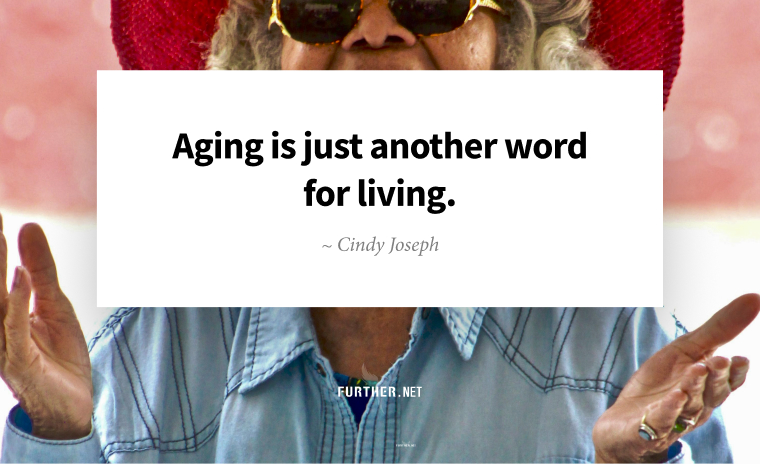
Do you know who’s ageist? (Besides most employers, consumer products companies, marketers, and media outlets, among countless others.)
Your brain.
Left on autopilot, it keeps you “safe” by buying into society’s version of older age as an unattractive, lonely stretch of growing irrelevance on the downhill slope toward death.
Cue The Verve’s “Bittersweet Symphony.”
Meanwhile, as we learned from psychologist Dr. Becca Levy in Breaking the Age Code, there’s scientific evidence that negative beliefs about getting older make them a self-fulfilling prophecy, with higher rates of memory loss, hearing impairment, and cardiovascular issues. Conversely, those with positive beliefs enjoy better health and increased longevity of up to seven and a half years.
Unfortunately, you can’t just declare you’re cool with getting older, and that’s that. But with a little mindful attention, you can stop worrying about getting older and start loving growing older.
Age-Old Facts
First, it helps to remind your brain that ageist stereotypes are old news. Once you’re past 50, you’re on the upward trajectory of the “U-shaped happiness curve.” You can enjoy the fruits of your labor with your hard-earned, valuable crystallized intelligence, which continues to grow as you age, along with your Subjective Well-being and emotional intelligence.
Plus, new research shows that some aspects of fluid intelligence — which include orienting, alerting, and executive function — don’t necessarily diminish with age. In fact, some aspects, like the ability to weed out irrelevant information (orienting), can actually improve.
Clearly, it’s time to ditch the doddering thoughts hobbling your ability to embrace aging.
Midlife Mindfulness
Mindfulness, with or without meditation, at any age is beneficial, as it grounds you in the present moment, inviting you to become curious about what you’re thinking and feeling. As Berit Lewisis, author of Ageing Upwards: A Mindfulness-based Framework for the Longevity Revolution, notes:
The benefits include improved concentration, more awareness, an ability to stay focused on what is important, and the ability to meet challenges with kindness, humour, resilience and mental adaptability.
Now, let’s apply that to how you consider your aging self. You can direct your attention to the things that make you feel less than, perhaps gray hair or wrinkles, or you can focus on what you like about yourself. You might even realize that your thoughts about things like how you look or feel are ageist beliefs that aren’t even your own. And you can acknowledge your discomfort around what’s changed in your life without letting it consume you.
The beauty of a mindful approach is that it welcomes self-compassion and allows you to approach your changing body and circumstances with an open and accepting beginner’s mind. Turns out Mark Twain was right when he said, “Age is an issue of mind over matter. If you don’t mind, it doesn’t matter.”
Rather than fearing getting old, here’s how to embrace it (Psyche)
